译林牛津版高中英语模块八Unit1 The written world Grammar and usage课件(共22张)
文档属性
| 名称 | 译林牛津版高中英语模块八Unit1 The written world Grammar and usage课件(共22张) | 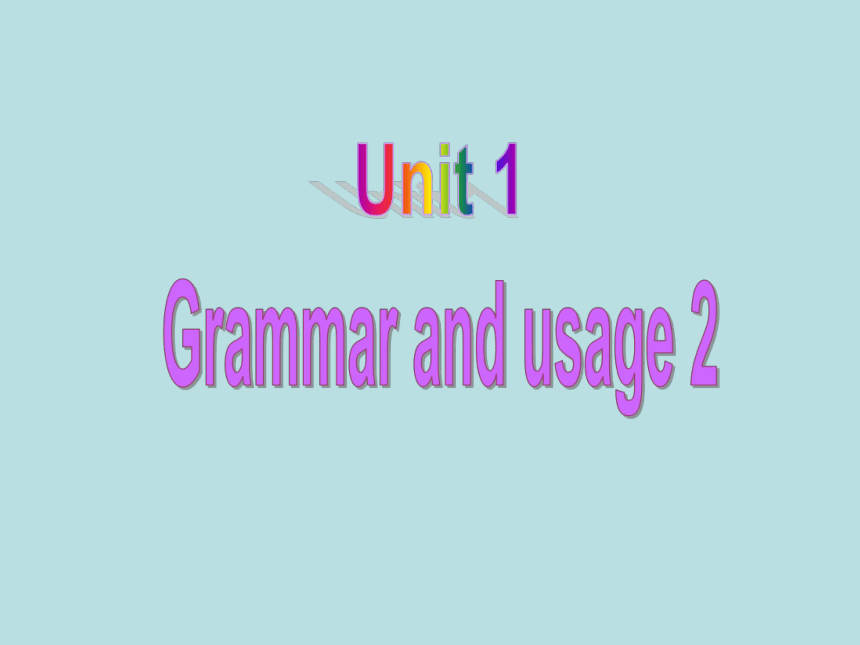 | |
| 格式 | zip | ||
| 文件大小 | 581.5KB | ||
| 资源类型 | 教案 | ||
| 版本资源 | 牛津译林版 | ||
| 科目 | 英语 | ||
| 更新时间 | 2019-06-17 19:04:10 | ||
图片预览

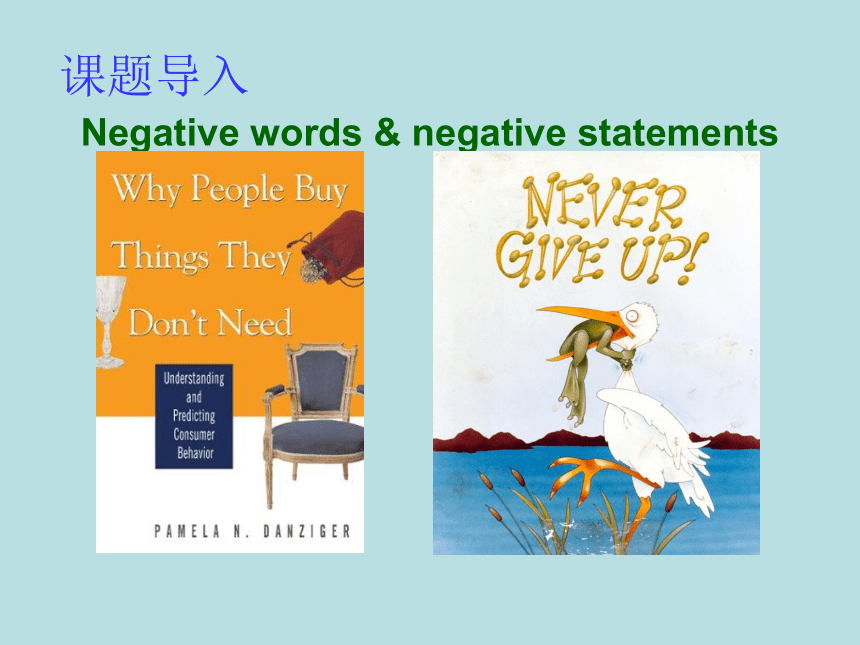
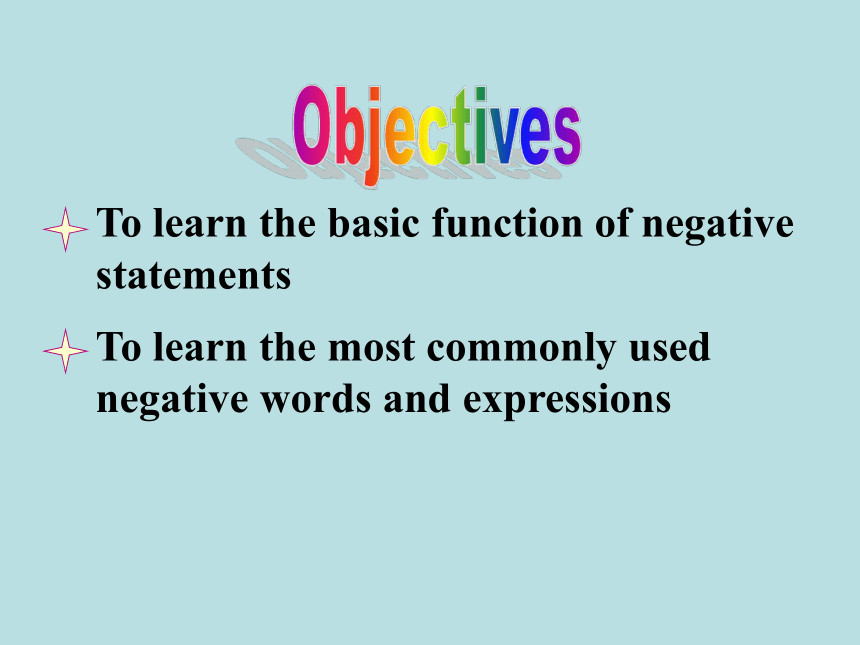
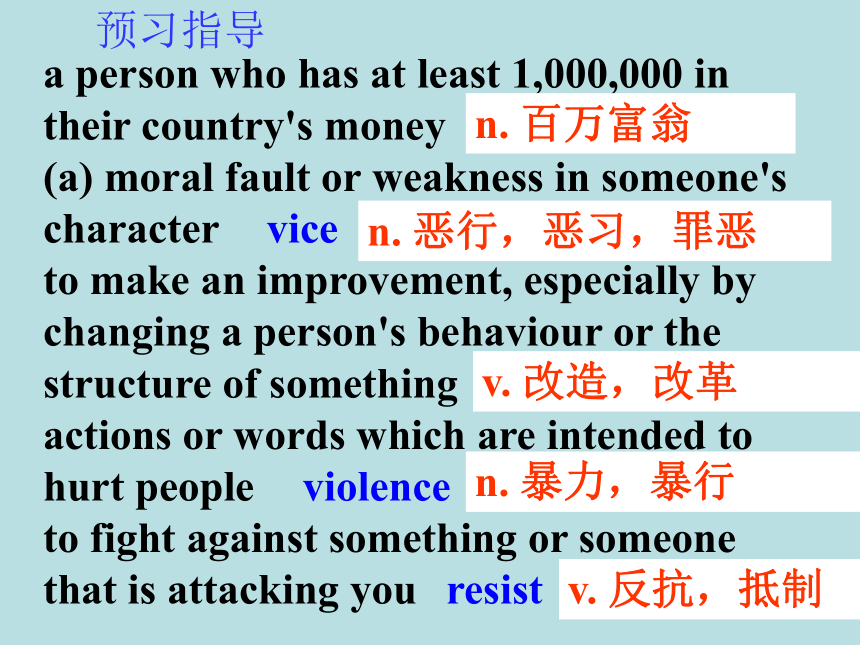
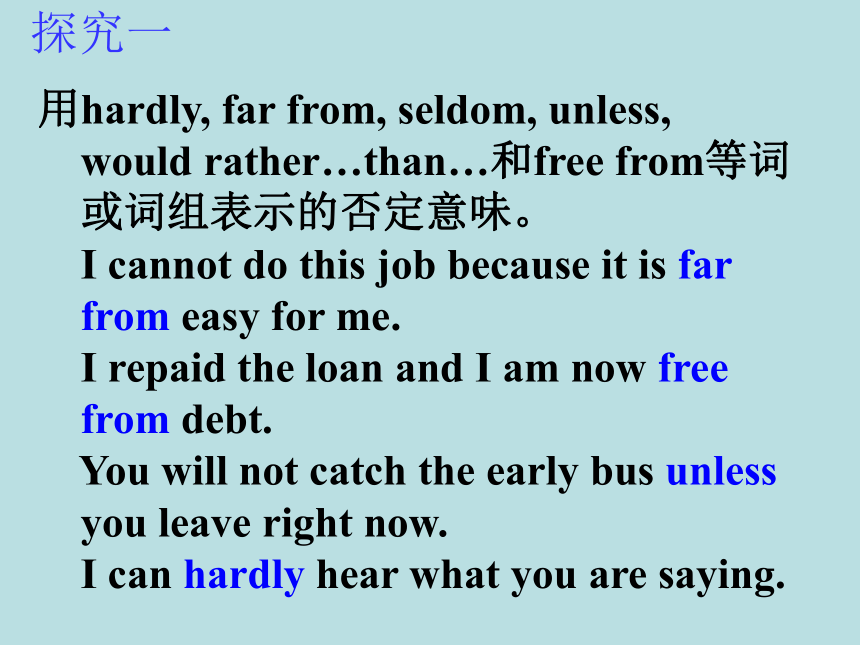
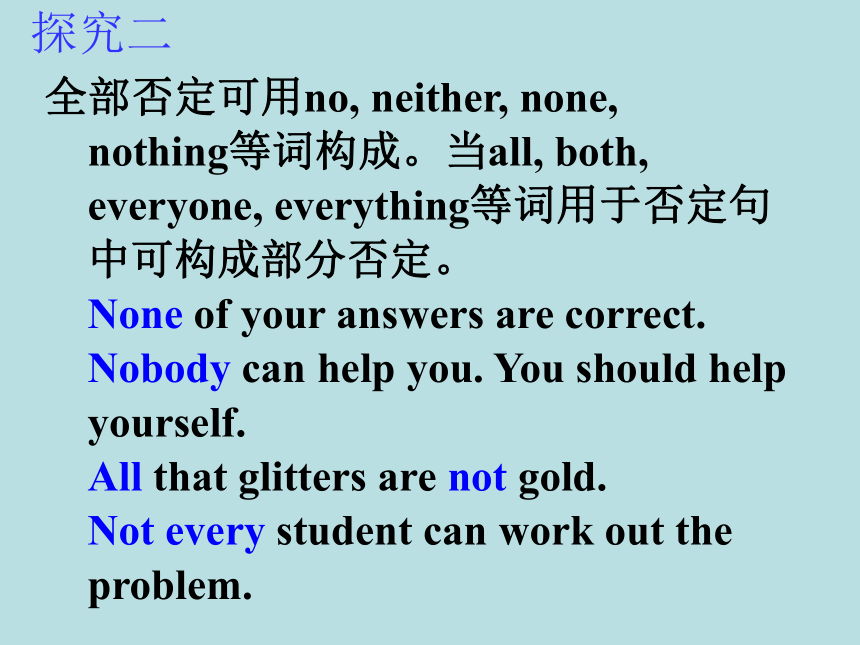
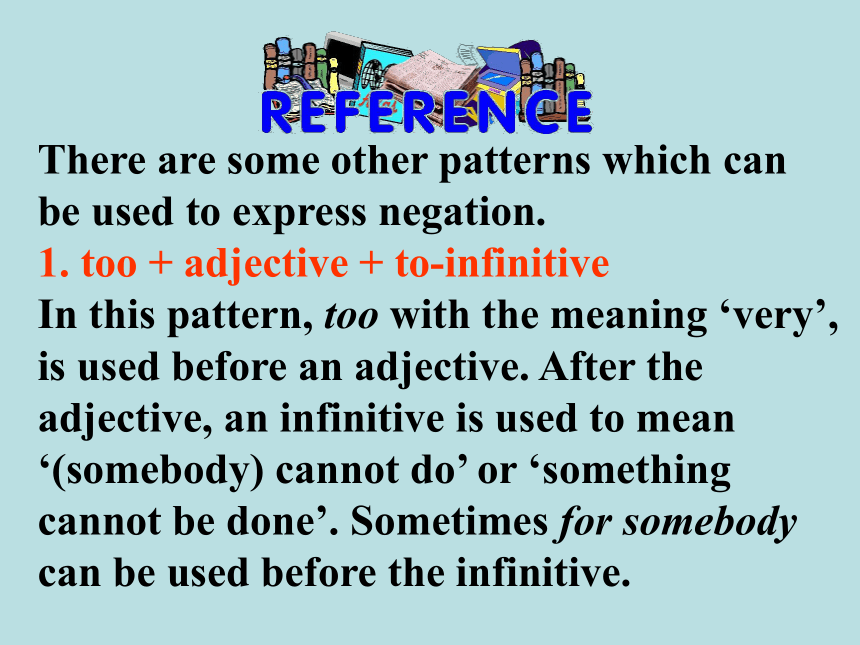
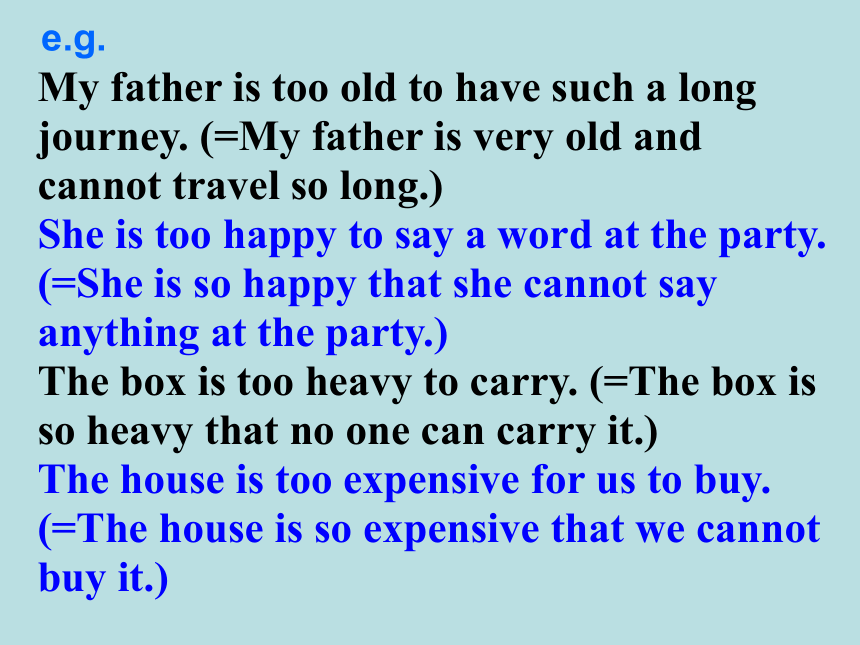
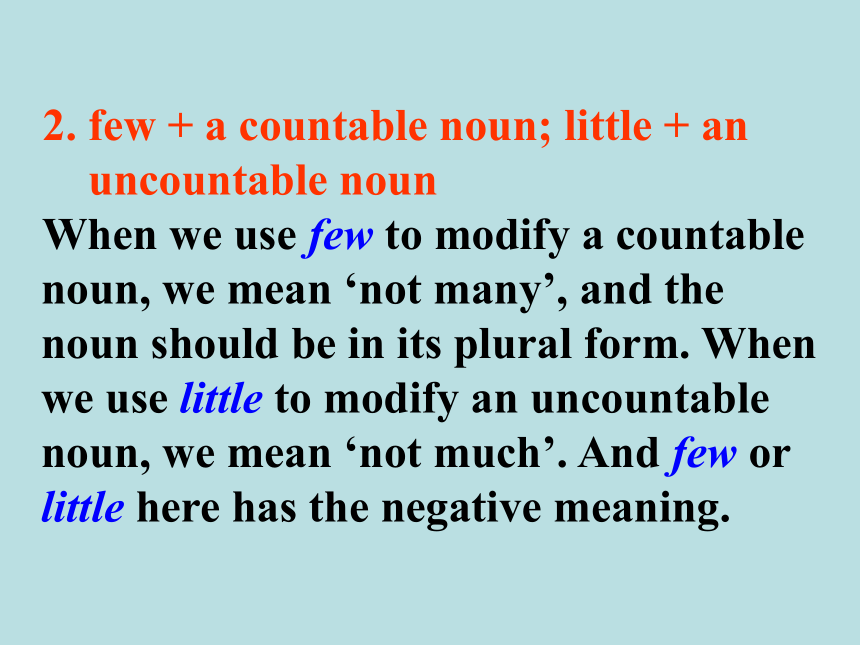
文档简介
课件22张PPT。Grammar and usage 2Unit 1Negative words & negative statements 课题导入To learn the basic fun_ction of negative statements
To learn the most commonly used negative words and expressionsObjectivesa person who has at least 1,000,000 in
their country's money
moral fault or weakness in someone's
character
to make an improvement, especially by
changing a person's behaviour or the
structure of something
actions or words which are intended to
hurt people
to fight against something or someone
that is attacking you millionairevicereformviolenceresistn. 百万富翁n. 恶行,恶习,罪恶v. 改造,改革n. 暴力,暴行v. 反抗,抵制预习指导用hardly, far from, seldom, unless,
would rather…than…和free from等词
或词组表示的否定意味。
I cannot do this job because it is far
from easy for me.
I repaid the loan and I am now free
from debt.
You will not catch the early bus unless
you leave right now.
I can hardly hear what you are saying.探究一全部否定可用no, neither, none,
nothing等词构成。当all, both,
everyone, everything等词用于否定句
中可构成部分否定。
None of your answers are correct.
Nobody can help you. You should help
yourself.
All that glitters are not gold.
Not every student can work out the
problem.探究二There are some other patterns which can be used to express negation.
1. too + adjective + to-infinitive
In this pattern, too with the meaning ‘very’, is used before an adjective. After the adjective, an infinitive is used to mean ‘(somebody) cannot do’ or ‘something cannot be done’. Sometimes for somebody can be used before the infinitive.e.g.
My father is too old to have such a long journey. (=My father is very old and cannot travel so long.)
She is too happy to say a word at the party. (=She is so happy that she cannot say anything at the party.)
The box is too heavy to carry. (=The box is so heavy that no one can carry it.)
The house is too expensive for us to buy. (=The house is so expensive that we cannot buy it.)
2. few + a countable noun; little + an
uncountable noun
When we use few to modify a countable noun, we mean ‘not many’, and the noun should be in its plural form. When we use little to modify an uncountable noun, we mean ‘not much’. And few or little here has the negative meaning. e.g.
Few students in our class have ever read Katherine Mansfield’s short stories. (=Not many/Only one or two students in our class have ever read Katherine Mansfield's short stories.)
We have little rain all this summer. (=It almost does not rain during this summer.)Because few or little has the negative meaning, we do not use the negative form in question tags.
e.g.
Few people liked his painting at that time, did they?
There is little ink in the bottle, is there? Read the sentences and complete them using the negative words. (P9) Many students ___________ read
contemporary novels _____ classics.
2. It is _____________ for students to have difficulty understanding classics.
3. __________ students in my class had read Oliver Twist, so I told them the story.
4. You _____ be ___ careful when collecting these statistics.would ratherthannot uncommonNot manycan’t tooTime for reflection1. The basic way to form a negative statement is to put the word ___ after the auxiliary verb.
2. When ‘not’ is used in ‘can’t…too…’ or ‘can’t…enough’, the meaning of the sentence becomes ________.
3. Can you exemplify some other negative expressions?notpositivesummaryPractice1. Henry was away from home for quite a bit and __ saw his family.
A. frequently B. seldom
C. always D. usually
2. — Do you need any help, Lucy?
— Yes, The job is ____ I could do myself.
A. less than B. more than
C. no more than D. not more than 3. Although Rosemary had suffered from
a serious illness for years, she lost ____
of her enthusiasm for life.
A. some B. neither
C. none D. all4. - Poor Steve! I could hardly
recognize him just now!
- ______. He has changed so much.
A. Never mind B. No problem
C. Not at all D. Me neither5. — I love the Internet. I’ve come to
know many friends on the Net.
— _____. Few of them would become
your real friends.
A. That’s for sure
B. It’s not the case
C. I couldn’t agree more
D. I’m pleased to know that6. George said that he would come to
school to see me the next day, but he
______.
A. wouldn’t B. didn’t
C. hasn’t D. hadn’t
7. — Which one of these do you want?
— ______. Either will do.
A. I don't mind B. I'm sure
C. No problem D. Go ahead8. By no means ______ to our plan for the
trip. A. will she agree B. she will agree
C. agrees she D. will agree she 9. Henry often helps look after Granny
Wang, but _______. A. seldom is George
B. seldom George does C. seldom does George
D. seldom looks George after Granny Wang 10. _____ which university to attend, the girl asked her teacher for advice.
A. Not knowing B. Knowing not
C. Not known D. Known not
Homework完成课本100页,C1; C2
To learn the most commonly used negative words and expressionsObjectivesa person who has at least 1,000,000 in
their country's money
moral fault or weakness in someone's
character
to make an improvement, especially by
changing a person's behaviour or the
structure of something
actions or words which are intended to
hurt people
to fight against something or someone
that is attacking you millionairevicereformviolenceresistn. 百万富翁n. 恶行,恶习,罪恶v. 改造,改革n. 暴力,暴行v. 反抗,抵制预习指导用hardly, far from, seldom, unless,
would rather…than…和free from等词
或词组表示的否定意味。
I cannot do this job because it is far
from easy for me.
I repaid the loan and I am now free
from debt.
You will not catch the early bus unless
you leave right now.
I can hardly hear what you are saying.探究一全部否定可用no, neither, none,
nothing等词构成。当all, both,
everyone, everything等词用于否定句
中可构成部分否定。
None of your answers are correct.
Nobody can help you. You should help
yourself.
All that glitters are not gold.
Not every student can work out the
problem.探究二There are some other patterns which can be used to express negation.
1. too + adjective + to-infinitive
In this pattern, too with the meaning ‘very’, is used before an adjective. After the adjective, an infinitive is used to mean ‘(somebody) cannot do’ or ‘something cannot be done’. Sometimes for somebody can be used before the infinitive.e.g.
My father is too old to have such a long journey. (=My father is very old and cannot travel so long.)
She is too happy to say a word at the party. (=She is so happy that she cannot say anything at the party.)
The box is too heavy to carry. (=The box is so heavy that no one can carry it.)
The house is too expensive for us to buy. (=The house is so expensive that we cannot buy it.)
2. few + a countable noun; little + an
uncountable noun
When we use few to modify a countable noun, we mean ‘not many’, and the noun should be in its plural form. When we use little to modify an uncountable noun, we mean ‘not much’. And few or little here has the negative meaning. e.g.
Few students in our class have ever read Katherine Mansfield’s short stories. (=Not many/Only one or two students in our class have ever read Katherine Mansfield's short stories.)
We have little rain all this summer. (=It almost does not rain during this summer.)Because few or little has the negative meaning, we do not use the negative form in question tags.
e.g.
Few people liked his painting at that time, did they?
There is little ink in the bottle, is there? Read the sentences and complete them using the negative words. (P9) Many students ___________ read
contemporary novels _____ classics.
2. It is _____________ for students to have difficulty understanding classics.
3. __________ students in my class had read Oliver Twist, so I told them the story.
4. You _____ be ___ careful when collecting these statistics.would ratherthannot uncommonNot manycan’t tooTime for reflection1. The basic way to form a negative statement is to put the word ___ after the auxiliary verb.
2. When ‘not’ is used in ‘can’t…too…’ or ‘can’t…enough’, the meaning of the sentence becomes ________.
3. Can you exemplify some other negative expressions?notpositivesummaryPractice1. Henry was away from home for quite a bit and __ saw his family.
A. frequently B. seldom
C. always D. usually
2. — Do you need any help, Lucy?
— Yes, The job is ____ I could do myself.
A. less than B. more than
C. no more than D. not more than 3. Although Rosemary had suffered from
a serious illness for years, she lost ____
of her enthusiasm for life.
A. some B. neither
C. none D. all4. - Poor Steve! I could hardly
recognize him just now!
- ______. He has changed so much.
A. Never mind B. No problem
C. Not at all D. Me neither5. — I love the Internet. I’ve come to
know many friends on the Net.
— _____. Few of them would become
your real friends.
A. That’s for sure
B. It’s not the case
C. I couldn’t agree more
D. I’m pleased to know that6. George said that he would come to
school to see me the next day, but he
______.
A. wouldn’t B. didn’t
C. hasn’t D. hadn’t
7. — Which one of these do you want?
— ______. Either will do.
A. I don't mind B. I'm sure
C. No problem D. Go ahead8. By no means ______ to our plan for the
trip. A. will she agree B. she will agree
C. agrees she D. will agree she 9. Henry often helps look after Granny
Wang, but _______. A. seldom is George
B. seldom George does C. seldom does George
D. seldom looks George after Granny Wang 10. _____ which university to attend, the girl asked her teacher for advice.
A. Not knowing B. Knowing not
C. Not known D. Known not
Homework完成课本100页,C1; C2
